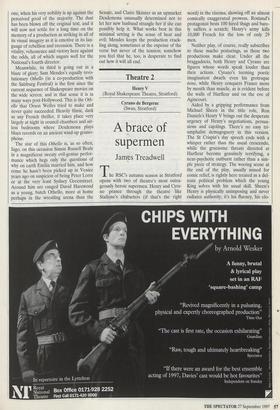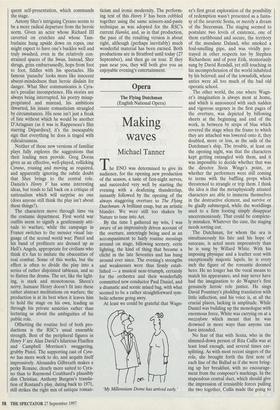Theatre 2
Henry V (Royal Shakespeare Theatre, Stratford) Cyrano de Bergerac (Swan, Stratford)
A brace of supermen
James Treadwell
The RSC's autumn season at Stratford opens with two of theatre's most outra- geously heroic supermen. Henry and Cyra- no prance through the theatre like Stallone's characters (if that's the right word) in the cinema, showing off an almost comically exaggerated prowess. Rostand's protagonist bests 100 hired thugs and bare- ly suffers a scratch; Henry's army kills 10,000 French for the loss of only 29 men.
Neither play, of course, really subscribes to these macho posturings, as these two productions make clear. Under all the braggadocio, both Henry and Cyrano are figures whose words speak louder than their actions. Cyrano's teeming poetic imagination dwarfs even his grotesque nose, while Henry conquers France more by mouth than muscle, as is evident before the walls of Harfleur and on the eve of Agincourt.
Aided by a gripping performance from Michael Sheen in the title role, Ron Daniels's Henry V brings out the desperate urgency of Henry's negotiations, persua- sions and cajolings. There's no easy tri- umphalist demagoguery in this version. The St Crispin's day speech ends with a whisper rather than the usual crescendo, while the gruesome threats directed at Harfleur become genuinely terrifying, a near-psychotic outburst rather than a sim- ple piece of strategy. The wooing scene at the end of the play, usually mined for comic relief, is rightly here treated as a del- icate political problem which the young King solves with his usual skill. Sheen's Henry is physically unimposing and never radiates authority; it's his fluency, his elo- quent self-presentation, which commands the stage.
Antony Sher's intriguing Cyrano seems to be a more radical departure from the heroic norm. Given an actor whose Richard III cavorted on crutches and whose Tam- burlaine hung upside down on ropes, one might expect to have one's buckles well and truly swashed, even in the relatively con- strained spaces of the Swan. Instead, Sher shrugs, grins embarrassedly, hops from foot to foot, fiddles with his spectacles. His famous 'panache' looks more like innocent absent-mindedness than heroic disdain for danger. What Sher communicates is Cyra- no's peculiar incompetence. His stories are always being interrupted, his poetry misap- propriated and misread, his ambitions thwarted, his innate romanticism strangled by circumstances. His nose isn't just a freak of fate without which he would be another D'Artagnan (as it was in Rappeneau's film starring Depardieu)-, it's the inescapable sign that everything he does is tinged with ridiculousness.
Neither of these new versions of familiar plays fully explores the suggestions that their leading men provide. Greg Doran gives us an effective, well-played, rollicking Cyrano, rousing and moving as required, and apparently ignoring the subtle doubt that Sher brings to the central role. Daniels's Henry V has some interesting ideas, but tends to fall back on a critique of nationalism which will surprise no one (does anyone still think the play isn't about these things?).
The characters move through time via the costume department. First world war outfits seem to signify a gentlemanly atti- tude to warfare, while the campaign in France switches to the messier visual lan- guage of the second world war; Pistol and his band of profiteers are dressed up as Hell's Angels, appropriate for civilians who think it's fun to imitate the obscenities of real combat. Some of this works, but the effect is often to divide the play into a series of rather disjointed tableaux, and so to flatten the drama. The set, like the light- ing, is stark and monotonous. Sheen's nervy, humane Henry doesn't fit into these rather abstract meditations on warfare; the production is at its best when it leaves him to hold the stage on his own, leading us through his private anxieties rather than lecturing us about the ambiguities of his public role.
Offsetting the routine feel of both pro- ductions is the RSC's usual ensemble strength. Best of the peripheral figures in Henry V are Alan David's hilarious Fluellen and Campbell Morrison's swaggering, grubby Pistol. The supporting cast of Cyra- no has more work to do, and acquits itself impressively. Alexandra Gilbreath makes a perky Roxane, clearly more suited to Cyra- no than to Raymond Coulthard's plausibly dim Christian. Anthony Burgess's transla- tion of Rostand's play, dating back to 1971, still strikes the right mix of antique roman- ticism and ironic modernity. The perform- ing text of this Henry V has been cobbled together using the same scissors-and-paste technique as was adopted for the RSC's current Hamlet, and, as in that production, the pace of the resulting version is about right, although (perhaps inevitably) much wonderful material has been excised. Both productions are in Stratford until today (27 September), and then go on tour. If they pass near you, they will both give you an enjoyable evening's entertainment.











































































 Previous page
Previous page